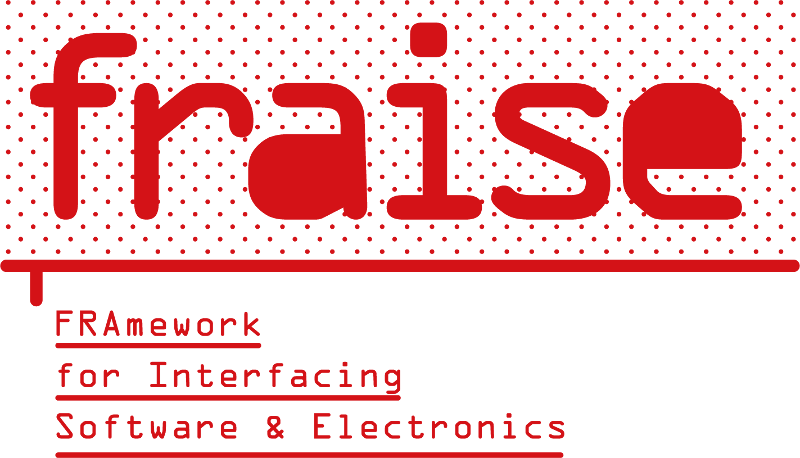 |
Fraise
2.1
FRAmework for Interfacing Software and Electronics
|
 |
Fraise
2.1
FRAmework for Interfacing Software and Electronics
|

Fraise is an easy yet powerful way to build programs for microcontroller boards, that can communicate together and with Pure Data (Pd).
Fraise is at the same time:
Two different microcontrollers board are currently supported by Fraise:
Fraise allows multiple boards to be connected to each other and to communicate with the host computer, via the USB connection of the first board.
The first board is fully programmable; it can be the only one in simple cases.
Additionally, it automatically implements the Fraise protocol, which can connect to up to 127 other boards (in the simplest case, the bus is formed by shorting Pico's pins 20 and 21; the buses on the various boards simply need to be connected together).
The Fraise bus is based on 9-bit asynchronous serial communication. Thanks to a carefully selected, moderate bitrate (250 kbs), the microcontroller boards can be located hundreds of meter away from the computer when connected through RS485 transceivers (called Fraiseivers).
This unique feature allows to build relatively complex installations, involving multiple distant sensors/actuators sets, that communicate reliably via wire with the central application, with minimal latency.
Fraise requires Pure Data version 0.54 or later.
Fraise can be installed through the built-in Pd externals installer, aka Deken (menu Help/Find externals), search for the **"Fraise"** library.
In order to develop Fraise firmwares by yourself, you will need the compilation toolchain (gcc, sdcc, cmake...) which is also available from Deken, install the **"Fraise-toolchain"** library for your system.
On Linux: you may need to authorize your user to use the USB serial devices; just type in a terminal:
sudo adduser [your_username] dialout
then logout (close your session) and re-login.
boards/pico/usb_bootloader.uf2 to the Pico's mass-storage directory, which should have been createdpico/fraise/example/blink.pd with Pd.The documentation for the Fraise firmware API is available there: Fraise API doc.
The low-level Fraise protocol is documented here: protocol.md.
Also, you can have a look at http://metalu.net/en/outils/fraise-overview/.
Fraise code is hosted at https://github.com/MetaluNet/Fraise,
the toolchain builder at https://github.com/MetaluNet/Fraise-toolchain.
Antoine Rousseau 2007-2024
license : GNU GPL (see LICENSE.txt )